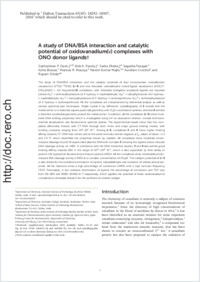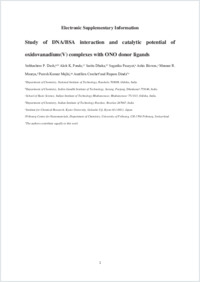A study of DNA/BSA interaction and catalytic potential of oxidovanadium(V) complexes with ONO donor ligands
- Dash, Subhashree P. Department of Chemistry, National Institute of Technology, Rourkela, India - Department of Chemistry, Kuchinda College, Kuchinda, Sambalpur, India
- Panda, Alok K. School of Basic Sciences, Indian Institute of Technology Bhubaneswar, India
- Dhaka, Sarita Department of Chemistry, Indian Institute of Technology Roorkee, India
- Pasayat, Sagarika Department of Chemistry, National Institute of Technology, Rourkela, India
- Biswas, Ashis School of Basic Sciences, Indian Institute of Technology Bhubaneswar, India
- Maurya, Mannar R. Department of Chemistry, Indian Institute of Technology Roorkee, India
- Majhi, Paresh Kumar Department of Chemistry, National Institute of Technology, Rourkela, India - Institute for Chemical Research, Kyoto University, Gokasho Uji, Japan
- Crochet, Aurélien Fribourg Center for Nanomaterials, Department of Chemistry, University of Fribourg, Switzerland
- Dinda, Rupam Department of Chemistry, National Institute of Technology, Rourkela, India
-
15.11.2016
Published in:
- Dalton Transaction. - 2016, vol. 45, no. 45, p. 18292–18307
English
The study of DNA/BSA interaction and the catalytic potential of four mononuclear oxidoalkoxido vanadium(V) [VVO(L¹⁻⁴)OEt] (1–4) and one dinuclear oxidoalkoxido mixed-ligand vanadium(V) [{VO(L²)OEt} ₂ (Q)]{Q = 4,4′-bipyridine}(5) complexes, with tridentate binegative aroylazine ligands are reported [where H₂L¹ = anthranylhydrazone of 2- hydroxy-1- napthaldehyde, H₂L² = salicylhydrazone of 2-hydroxy-1- napthaldehyde, H₂L³ = benzoylhydrazone of 2-hydroxy-1- acetonaphthone, H₂L⁴ = anthranylhydrazone of 2-hydroxy-1- acetonaphthone]. All the complexes are characterized by elemental analysis as well as various spectroscopic techniques. Single crystal X-ray diffraction crystallography of 2 reveals that the metal centre is in distorted square pyramidal geometry with O₄N coordination spheres, whereas 5 exhibits a distorted octahedral geometry around the metal center. In addition, all the complexes (1–5) show moderate DNA binding propensity which is investigated using UV-vis absorption titration, circular dichroism, thermal denaturation and fluorescence spectral studies. The experimental results show that the complexes effectively interact with CT-DNA through both minor and major groove binding modes, with binding constants ranging from 10⁴ −10⁵ M⁻¹. Among 1–5, complexes 3 and 4 show higher binding affinity towards CT-DNA than others and at the same time also exhibit negative ΔTm values of about ∼1.5 and 1.0 °C which resembles the properties shown by cisplatin. All complexes show moderate photo-induced cleavage of pUC19 supercoiled plasmid DNA with complex 3 showing the highest photo induced DNA cleavage activity of ∼48%. In coherence with the DNA interaction studies, 3 and 4 also exhibit good binding affinity towards BSA in the range of 10¹⁰ −10¹¹ M⁻¹, which is also supported by their ability to quench the tryptophan fluorescence emission spectra of BSA. All the complexes show remarkable photo-induced BSA cleavage activity (>90%) at a complex concentration of 50 μM. The catalytic potential of 1–5 is also tested for the oxidative bromination of styrene, salicylaldehyde and oxidation of methyl phenyl sulphide. All the reactions show a high percentage of conversion (>90%) with a high turnover frequency (TOF). Particularly, in the oxidative bromination of styrene the percentage of conversion and TOF vary from 96–98% and 8000–19 600 (h⁻¹) respectively, which signifies the potential of these oxidovanadium(V) complexes to stimulate research for the synthesis of a better catalyst.
- Faculty
- Faculté des sciences et de médecine
- Department
- Département de Chimie
- Language
-
- English
- Classification
- Chemistry
- License
- License undefined
- Identifiers
-
- RERO DOC 278484
- DOI 10.1039/C6DT03228A
- Persistent URL
- https://folia.unifr.ch/unifr/documents/305238
Other files
Statistics
Document views: 70
File downloads:
- cro_sdi.pdf: 272
- cro_sdi_sm.pdf: 180
- cro_sdi_sm2.txt: 63


